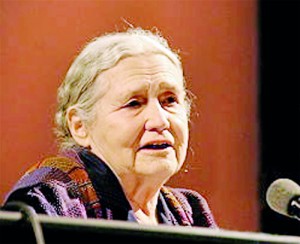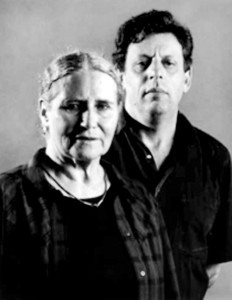Use your anger to fuel creativity
Looking like anybody’s favourite aunt or great-aunt – diminutive, portly and rounded in a huggable way, her wavy silver hair neatly combed and in place and sparkling under the lights – the British writer Doris Lessing walked slowly, inching past us, as she was led down the steep stairs to the podium of a lecture hall at the University of Hong Kong, in Pokfulam, Hong Kong Island. The year was 1994, two decades ago.
The Nobel Prize-winning writer had not won the Nobel yet – that came in 2007, but she had chalked up a lot of other literary accolades up to that point. The celebrity writer was on a one-week visit to Hong Kong.

The British writer Doris Lessing was the oldest writer to be awarded the Nobel Prize in Literature. She was 88 years when she won the award in 2007. Photo: Elke Wetzig/WikiCommons
We remembered the occasion, if not all of the content of what Lessing said that afternoon in what was less a lecture than a reading from her writings, followed by a question-and-answer session. The occasion seems like only the other day, so it came as a mild shock to have the time confirmed as March 1994. A check on the internet yielded only one “Doris Lessing in Hong Kong” reference, and that was undated.
Lessing’s visit dates were confirmed by a colleague working at the South China Morning Post, Hong Kong’s main English language newspaper. The daily’s archives had a reference to a book signing by Doris Lessing on Saturday, March 5, 1994, at the South China Morning Post Bookshop, at the Star Ferry jetty, by Victoria Harbour. The undated online reference was from the blog of writer and columnist Nury Vittachi, who had gone with his wife that day to the Star Ferry bookshop to have a book of Lessing’s autographed.
Nury Vittachi describes finding Doris Lessing sitting at a table reading a book. The book, which a salesperson had chosen for the writer to browse, was one written by Nury Vittachi. The happy encounter saw both writers autographing and exchanging books and notes about Hong Kong.
Vittachi’s blog vignette read with video-like clarity because we could picture with photographic accuracy the two writers and the book-lined setting. The two Star Ferry-South China Morning Post Bookshops, on the Hong Kong and Kowloon sides of Victoria Harbour, were favourite weekend browsing spots for anyone with a yen for books. Nury Vittachi, son of the Sri Lanka-born journalist Tarzie Vittachi, was a familiar figure, having sat a couple of desks away during our time at the Hong Kong newspaper office; and Doris Lessing we had seen close-up.

British writer Doris Lessing and American composer Philip Glass collaborated on two operas based on books by Lessing. Photo: Jim Caldwell, courtesy of Houston Grand Opera
Doris Lessing’s visit to the University of Hong Kong had been arranged by a group of women academics. Lessing, who died two months ago, on November 17, 2013, age 94, is regarded as one of the great feminist writers of the 20th century, although the writer rejected the “feminist” tag.
The question-and-answer session soon petered out, with Lessing showing lessening interest in fielding stereotypical feminist queries. What followed instead was a chatty, uninterrupted monologue, as the writer directly engaged with the audience.
Three things from what she said that afternoon 20 years ago we recall clearly.
One was how she came to write one of her better-known books, “The Fifth Child”, a kind of horror story about a monstrous offspring that terrorises the family it is born to. Lessing had read a true story about such a family and child while leafing through a magazine in a dentist’s waiting room. That was the germ of the book that followed. The source of a writer’s inspiration is always a matter of interest to readers and writers; often, amazingly original and unusual plots are traceable to true incidents and experiences. More often than not, truth is a lot stranger than fiction.
The second thing we recall from Lessing’s talk was an aside she made after having spoken at length about her own long writing career, and that was her acceptance of the finite nature of a writer’s life, and the grim fact that a writer’s work will, if it is good enough, long outlive the writer. Lessing seemed to be hinting that she herself was somewhat caught by surprise by this obvious realisation. She looked very directly at her audience, as if to warn any writers or would-be writers present that books waiting to be written should not be kept waiting too long, and that “time is of the essence.”
If there is any writer of substance in the past 50 years who hugely capitalised on her-his allocated writing time, it surely has to be Doris Lessing. Her bibliography is prodigious, with 71 published titles, as listed in one source.
The third comment Lessing made that glows in the memory like a row of red-hot iron letters blazing in the dark is what she said about anger: Try to harness anger, a legitimate and unavoidable human emotion, and make it serve you. “Anger is energy,” Lessing said, and energy fuels creativity, she added.
It was an interesting concept: that you have the choice to convert a powerful negative force into something positive, even valuable. To a Sri Lankan, used to hearing nothing but anger in the News from Home all through the ’90s (and long before and for many years after), Lessing’s wise remark was a little revelation.
A wild caricature filled a cartoon balloon in our imagination of an island republic, tossing in anger and pain in its Indian Ocean cradle, and populated by thousands of righteous Furies, all furiously pounding away at keyboards to produce texts and tomes of thunderous content.
Doris Lessing essayed almost every category of writing available to a writer: novels, short stories, poetry, drama, science (or space) fiction, children’s books, essays, autobiography, and even a “comic” (a graphic novel). You name it, she wrote it. She also wrote libretti – for operas based on two of her books.
And here, like the Nury Vittachi-Doris Lessing-Star Ferry-bookshop anecdote, comes another vignette, from our own blog, involving another celebrity-in-town, a musician. This story too has a Doris Lessing element (or we wouldn’t be bringing it up), and holds a special Hong Kong resonance for us.
In 1986, the New York-based composer Philip Glass made a three-act opera out of Doris Lessing’s sci-fi novel, “The Making of the Representative for Planet 8”. Lessing wrote the libretto. Eleven years later, in 1997, Lessing and Glass collaborated again, on another piece of Lessing sci-fi, “The Marriages Between Zones Three, Four and Five.” The operas have been performed in the US and Britain and Europe.
One of her books is arrestingly titled “The Good Terrorist.” It is a fictional tale of a decent, educated British woman who is drawn into organising acts of violence. It was shortlisted for the 1985 Booker Prize. Getting a title like that past Sri Lanka Customs in 1985 might have been tricky. (In 2006, the same concern forced us to smuggle in “Terrorist”, John Updike’s new novel that year, by hiding the dust cover inside a magazine; that piece of fiction too has a lead character, a gentle American-Muslim youth, who is persuaded to espouse violence for a cause.)
Philip Glass, described in one website as one of the 20th century’s most influential composers, is a world traveller and a frequent visitor to Hong Kong. We heard the Philip Glass Ensemble on two occasions. The first was in the early ’90s, at the Hong Kong Cultural Centre, where we had a front-row seat for a high-octane, high-decibel performance of a shimmering all-Glass programme. The concert was memorable to this listener for many reasons, one being the performance of the mesmerising “Low” Symphony, inspired by music by David Bowie, but mostly for the unvarying loudness of the music. This was our first first-hand, full-blown Glass experience, and it was close to shattering.
Gaining awareness of the Glass mannerisms, absorbed in short takes through recordings, is one thing; sitting through a live, blazing Glass performance is another. Glass the minimalist will repeat to infinity a single music motif of a couple of notes – the sheer repetitiveness lulling you into an acoustically induced trance. For many, Philip Glass is an instant music love affair; for others the composer is a taste acquired – if acquired at all – rather slowly. The music that night was played FFF – treble fortissimo. The packed hall was ecstatic.
The other Philip Glass concert was at the Kwai Tsing Theatre, some time in the late ’90s. What was special for us that week was that Philip Glass would be our lunch guest the following Sunday at the Woodside Arts Centre, in Quarry Bay, Hong Kong. As one of the founders of the chamber music and visual arts venue, we were hosting the Philip Glass Ensemble to a veggie meal (Glass and his team are vegetarians) on the last day of their Hong Kong tour. The Woodside Arts Centre, which flourished for three years before the Hong Kong Government took over the property, was positioned halfway up a mountain, inside a country park. We assumed the Glass Ensemble would be tempted by our very “green” invitation, the setting being one of the greenest in Hong Kong, and the food being essentially Chinese greens.
Lunch was a huge buffet spread of vegetarian dishes, served up by the Woodside Arts Centre committee. We were excited to be entertaining one of the world’s most celebrated musicians. The members of the Philip Glass Ensemble all turned up – except Philip Glass. We waited, then started eating before the food went cold. A call came through. It was Philip Glass. Mr. and Mrs. Glass sent their thanks to the hosts, but deeply regretted they could not come to lunch as they were at the other end of Hong Kong Island, on Hollywood Road and Cat Street, buying antique Chinese furniture to take back to New York.
If Philip Glass had turned up for lunch, and had we been fortunate to have a moment of his company, we might have asked him, among other things, about his artistic partnership with Doris Lessing. The writer-musician pact is a fascinating area for enquiry and research into creative endeavour.
Mention Doris Lessing – and we invariably think of a hot Hong Kong afternoon long ago; of Hong Kong academe; of Victoria Harbour glittering in the background. And then of another hot Hong Kong summer afternoon and Lessing’s artistic partner Philip Glass and his deafening ensemble; of Chinese antiques and huge leftovers of food – red and white rice and rice wine, Chinese soups and stews, and dishes of cabbage, celery, chives, melon, mushroom, string bean, bamboo shoots, bok-choi and soybean – steamed, or in sweet-and-sour sauce, or stir-fried with black fungus and gingko nuts.


